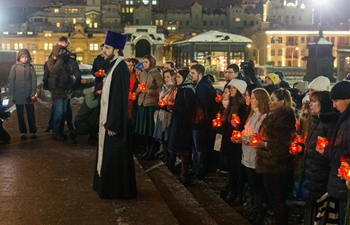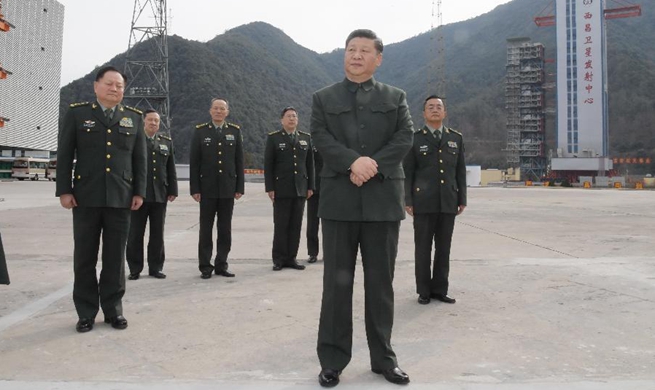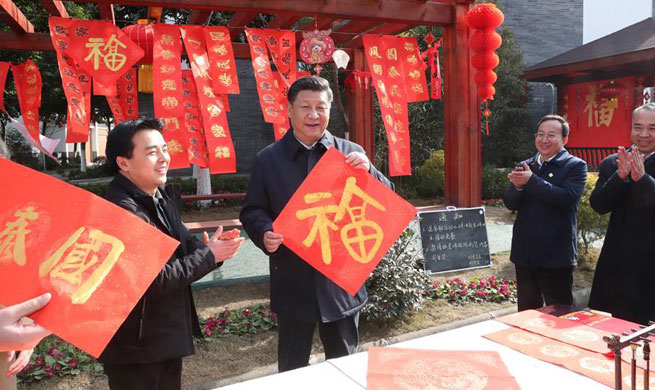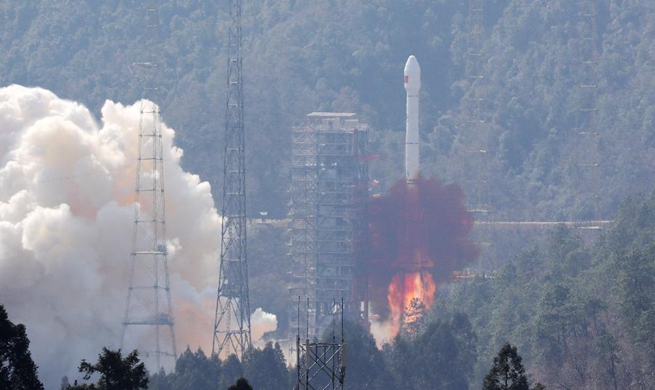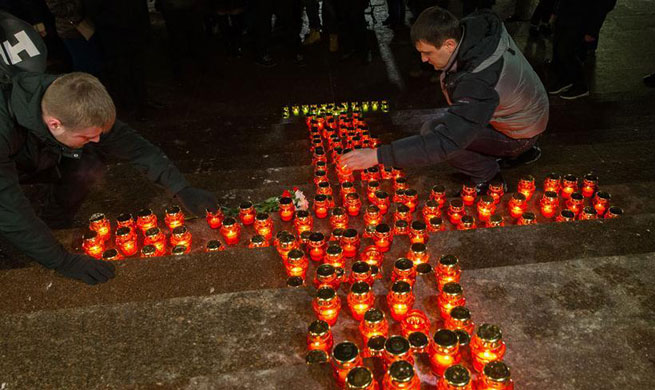RAMALLAH, Feb. 12 (Xinhua) -- In response to Trump's remarks that the Palestinians "are not interested" in the peace process, a senior Palestinian official said Monday the Palestinians are the most benefiting side out of a serious peace process in the Middle East.
In a special interview with Xinhua, Mohamed Ishtayeh, a member in the central committee of Palestinian President Mahmoud Abbas Fatah Party and a former peace negotiator with Israel, said "the Palestinians want a serious peace process that ends the Israeli military occupation and bring them their legitimate rights back."
He went on saying in an interview at his office in Ramallah that the Palestinians are ready, immediately, when there is seriousness in a political process that has a clear reference on the basis of international legitimacy and international law, and with an honest broker and an international engagement."
Ishtayeh stressed that the thing which the Palestinians never accept "is to go for a peace process that becomes a bridge for Israel to pass and dictate its projects of settlement expansion and devote its military occupation on the Palestinian lands."
"We had repeatedly tried over the past so many years the track of a U.S.-sponsored track of bilateral peace negotiations, and every time, these talks fail ... the problem always was that there was no fair mediator and there was no real Israeli peace partner," said Ishtayeh.
He noted that the current Israeli government of Prime Minister Benjamin Netanyahu "is not a partner in a political peace track, simply because it is a government of settlers who doesn't want to end the military occupation of the Palestinian territories."
Ishtayeh was commenting on Trump's remarks he made in an interview published in the Israeli newspaper Israel Hayom where he accused the Palestinians that currently they don't have the will and the desire to make peace."
Trump also said in the interview with the Israeli paper that "we are waiting to see what will happen in order to present our peace initiative, but I still can't see that the Palestinians are really looking for making peace," adding that he is not certain that Israel is determined to make peace, and both sides should provide concessions.
"The Palestinian leadership has positively responded to all the U.S. and international calls over the past years in a hope of finding a serious political path," said Ishtayeh, adding that "the Palestinian side has tried all the tracks for this, but without results."
He stressed that President Abbas met with Netanyahu in three separate occasions; however, "every time the prime minister of Israel refuses to discuss any serious political track that leads to a real peace in the Middle East," adding "the problem is that there is real peace partner in Israel."
"Besides that, the recent declaration of President Trump in December 6 that Jerusalem is the capital of Israel had proofed that the United States is not a fair and serious mediator in sponsoring a serious peace process in the Middle East."
In the interview with the Israeli paper, "once again, Trump reiterated that Jerusalem has already become the capital of the state of Israel, and that he signed on a decree to move the embassy of his country from Tel Aviv to Jerusalem," something that was completely rejected by the Arabs and Muslims.
Ishtayeh stressed on the strict Palestinian rejection of Trump's declaration on Jerusalem, adding that "Jerusalem would remain the capital of the Palestinians, no matter how Israel, the United States or others made decisions contrary to that."
He pointed out that "Israel annexed Jerusalem as a unified capital in 1980, but it has repeatedly negotiated the city several times in the past rounds of repeated bilateral negotiations, which were under the US auspices."
Ishtayeh added that "Jerusalem cannot be taken out of the Palestinian context because the city with its people, historically, in terms of civilization, culture and religion is a major component of the Palestinian people."
In response to the U.S. decision on Jerusalem, the Palestinians declared that Washington is no longer an acceptable mediator for the peace process as well as between them and Israel. The Palestinians suggested a multilateral international mechanism or sponsorship for any upcoming peace talks with Israel.
In this regard, Ishtayeh said that the Palestinian attempts are continuing intensively to find multilateral international sponsorship to which Washington is a party and not the only party.
"We keep looking for alternatives and President Abbas is conducting consultations with the international community and will address the UN Security Council on the Feb. 20 to emphasize the need for an international mechanism for a serious and fruitful peace process," said Ishtayeh.
He stressed that "the negotiating process in its old bilateral form is no longer acceptable to the Palestinians and is no longer feasible because it did not achieve any results or progress, therefore, we must search for other mechanisms."
"One of the mechanisms is to hold an international conference in which all parties join on the basis of the reference to the resolutions of international legitimacy and UN resolutions," he said.
Ishtayeh added that the Palestinians will continue their efforts to achieve this and "to ensure that we are concerned with a serious and genuine political path based on international legitimacy and international law."
Peace talks between the Palestinians and Israel have been stalled since 2014 after nine months of U.S.-sponsored negotiations. The talks have not led to any serious breakthrough to end decades-old conflict due to deep differences on settlements, borders and security.





